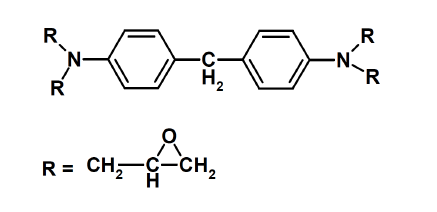Enhanced TDS
Identification & Functionality
- Blend
- No
- Chemical Family
- Composite Materials Functions
- Function
- Resins, Binders & Matrix Materials
- Single Ingredient
- Yes
- Technologies
- Product Families
- Chemical Structure

Features & Benefits
- Materials Features
- Features
- Low viscosity for processing temperature
- Exceptionally long pot life
- Excellent wet-out of reinforcements
- Exceptionally good long-term, high-temperature performance
- Low moisture uptake
- Outstanding hot-wet performance
- Exceptional chemical and heat resistance
- Extremely high glass transition temperatures
- Excellent retention of modulus at elevated temperatures
- Good electrical properties
- Extremely low shrinkage
- Individual components are room temperature stable
Applications & Uses
- Application Area
- Composites Processing Methods
- Markets
- Applications
- Processing
Carefully heat the ARALDITE® MY 721 resin to 50°C and slowly stir in the ARADUR® 5200 hardener until a clear homogenous solution is obtained. For a clear casting, maintain a temperature between 40°C and 50°C and degas for 15 minutes at 30 inches of mercury. Then pour the material into the molds and cure according to the cure schedule listed below.
Properties
- Physical Form
Regulatory & Compliance
Packaging & Availability
- Regional Availability
Storage & Handling
- Storage and Handling Information
ARALDITE® MY 721 Resin is available in 145, 450, and 500 pound metal drums. The product should be stored in a dry place, in the sealed original container, away from heat and humidity, at temperatures between 2°C and 8°C (35.6°F and 46.4°F). Under these storage conditions, the shelf life is 2 years (from date of manufacture). The product should not be exposed to direct sunlight.
Other
- Appearance
- Clear brown liquid
- Color (SDS)
- Brown
- Odor (SDS)
- Slight
- Chemical Properties
Value Units Test Method / Conditions Epoxy Equivalent Weight 111.0-117.0 g/eq - Electrical Properties
Value Units Test Method / Conditions Dielectric Strength 440.0 V/mil - Mechanical Properties
Value Units Test Method / Conditions Flexural Strength 14.9 ksi Tensile Strength 8.7 ksi - Physical Properties
Value Units Test Method / Conditions Density 1.15-1.18 g/cm³ at 25°C Glass Transition Temperature (Tg) 237.0 °C Differential Scanning Calorimetry samples cured 2h at 150°C + 2h at 180°C, dry Glass Transition Temperature (Tg) 231.0 °C Differential Scanning Calorimetry samples cured 2h at 150°C + 2h at 180°C, wet Glass Transition Temperature (Tg) 214.0 °C Thermomechanical Analyzer samples cured 2h at 150°C + 2h at 180°C Viscosity 3000.0-6000.0 cPs at 50°C
